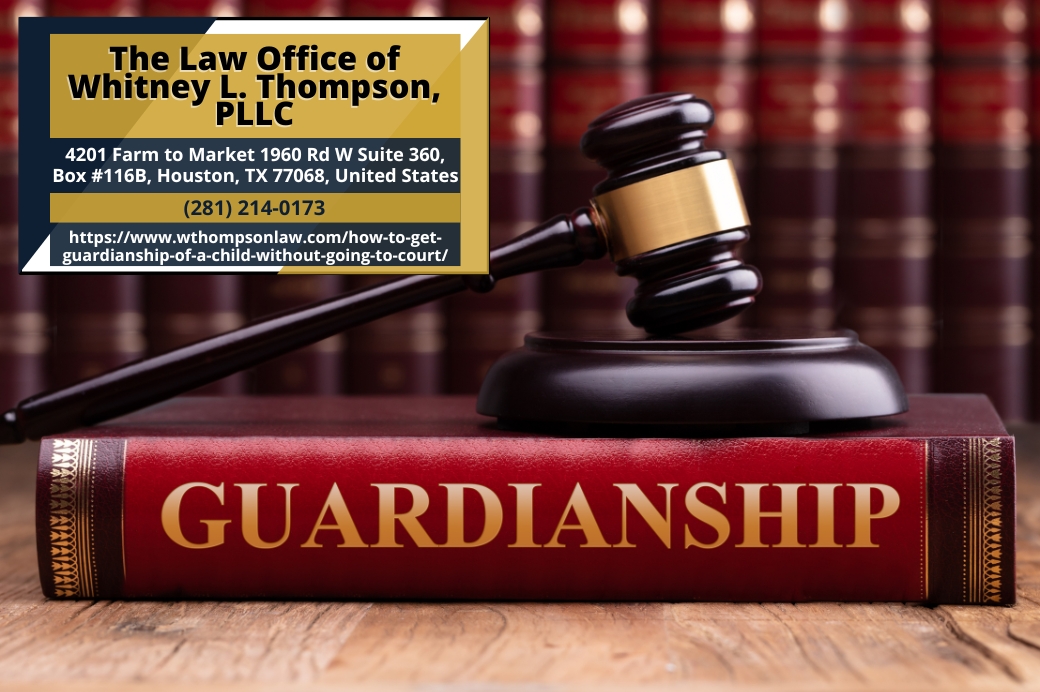Houston guardianship lawyer Whitney L. Thompson (https://www.wthompsonlaw.com/how-to-get-guardianship-of-a-child-without-going-to-court/) is offering guidance on how families can arrange for a child’s care without navigating court proceedings. In Texas, guardianship, often referred to as conservatorship, involves legal authority over a child’s well-being when parents are unable to fulfill that role. Whitney L. Thompson highlights methods under Texas law that allow guardianship arrangements without requiring a formal court process. This insight is essential for families looking for a faster, less stressful path to ensuring a child's care.
As a Houston guardianship lawyer, Whitney L. Thompson clarifies that certain legal tools, such as an Authorization Agreement for Nonparent Relative or Voluntary Caregiver and a Power of Attorney for Childcare, enable temporary arrangements outside the courtroom. These documents can offer essential protections and decision-making rights without the need for litigation. While guardianship traditionally involves legal proceedings, Texas families may avoid this route by meeting key legal requirements and prioritizing cooperation.
The Houston guardianship lawyer explains that a properly executed Authorization Agreement allows a designated adult caregiver, often a relative, to provide for a child’s daily needs, such as enrolling in school, seeking medical care, and accessing public benefits. According to Whitney L. Thompson, “Under Texas Family Code Chapter 34, an Authorization Agreement for a Voluntary Adult Caregiver permits a nonparent to undertake various duties for a child.” The agreement is signed and notarized by the parent and the caregiver, serving as a binding arrangement that defines the rights and responsibilities involved.
The Law Office of Whitney L. Thompson, PLLC, emphasizes the importance of parental consent and clear documentation. A notarized affidavit of parental consent can strengthen the agreement and demonstrate that the arrangement was made voluntarily. Once complete, this documentation can be shared with schools and medical providers to ensure continuity in the child’s care and prevent delays in decision-making.
The firm also explains the duration and limitations of such agreements. They are typically valid for up to 180 days but may be renewed as needed. If circumstances change, such as parents being able to resume care, the agreement may be terminated. Conversely, if a long-term solution is required, a court order for formal guardianship may be necessary. Whitney L. Thompson provides clarity on these transitions, offering legal support when changes in custody status are needed.
For situations where the caregiver is not a relative, Whitney L. Thompson advises that a Power of Attorney for Childcare may be more appropriate. This document gives the caregiver the authority to act on behalf of the child within limits defined by the parent. The parent retains the right to revoke the arrangement at any time by issuing a formal revocation notice. This approach offers families flexibility while maintaining legal control.
While these methods do not transfer custody or terminate parental rights, they allow for responsible temporary caregiving. The Houston guardianship lawyer points out that a Power of Attorney can be particularly useful when a parent must be away due to military service, medical treatment, or other life events. The authority granted can include decisions related to medical care, education, and extracurricular activities.
According to Whitney L. Thompson, choosing the right individual to care for a child requires careful consideration. The relationship between the child and caregiver, the caregiver’s ability to provide a stable environment, shared values, and a willingness to commit to the role are all important. These factors contribute to the child’s stability and emotional health during the transition.
In cases where a child’s parents are deceased, their rights have been terminated, or significant assets are involved, guardianship may still require court involvement. However, for temporary or voluntary arrangements, these legal tools can offer a practical alternative. Whitney L. Thompson encourages families to plan thoughtfully and document arrangements to protect the child’s interests.
Understanding available legal mechanisms for guardianship without court involvement allows parents and caregivers to act swiftly and legally. Whitney L. Thompson’s guidance provides families with options that reduce stress and delay, while keeping the child’s safety and stability at the forefront.
Families considering this route can consult with The Law Office of Whitney L. Thompson, PLLC to evaluate the best approach for their circumstances. Whitney L. Thompson assists in drafting the necessary documentation and provides support throughout the process, ensuring legal compliance.
The Law Office of Whitney L. Thompson, PLLC, remains committed to serving Houston families who are navigating the challenges of guardianship. Legal support tailored to non-court solutions can help families maintain control and provide essential care during critical periods in a child's life.
About The Law Office of Whitney L. Thompson, PLLC:
The Law Office of Whitney L. Thompson, PLLC, is dedicated to helping families in Houston navigate legal matters, including guardianship, custody, and estate planning. Led by attorney Whitney L. Thompson, the firm provides support for families seeking practical solutions that prioritize the welfare and stability of children.
Embeds:
Youtube Video: https://www.youtube.com/watch?v=28eSMLaHwkE
GMB: https://www.google.com/maps?cid=9428708165305469162
Email and website
Email: info@wthompsonlaw.com
Website: https://www.wthompsonlaw.com/
Media Contact
Company Name: The Law Office of Whitney L. Thompson, PLLC
Contact Person: Whitney L. Thompson
Email: Send Email
Phone: (281) 214-0173
Address:4201 Farm to Market 1960 Rd W Suite 360
City: Houston
State: Texas 77068
Country: United States
Website: https://www.wthompsonlaw.com/






